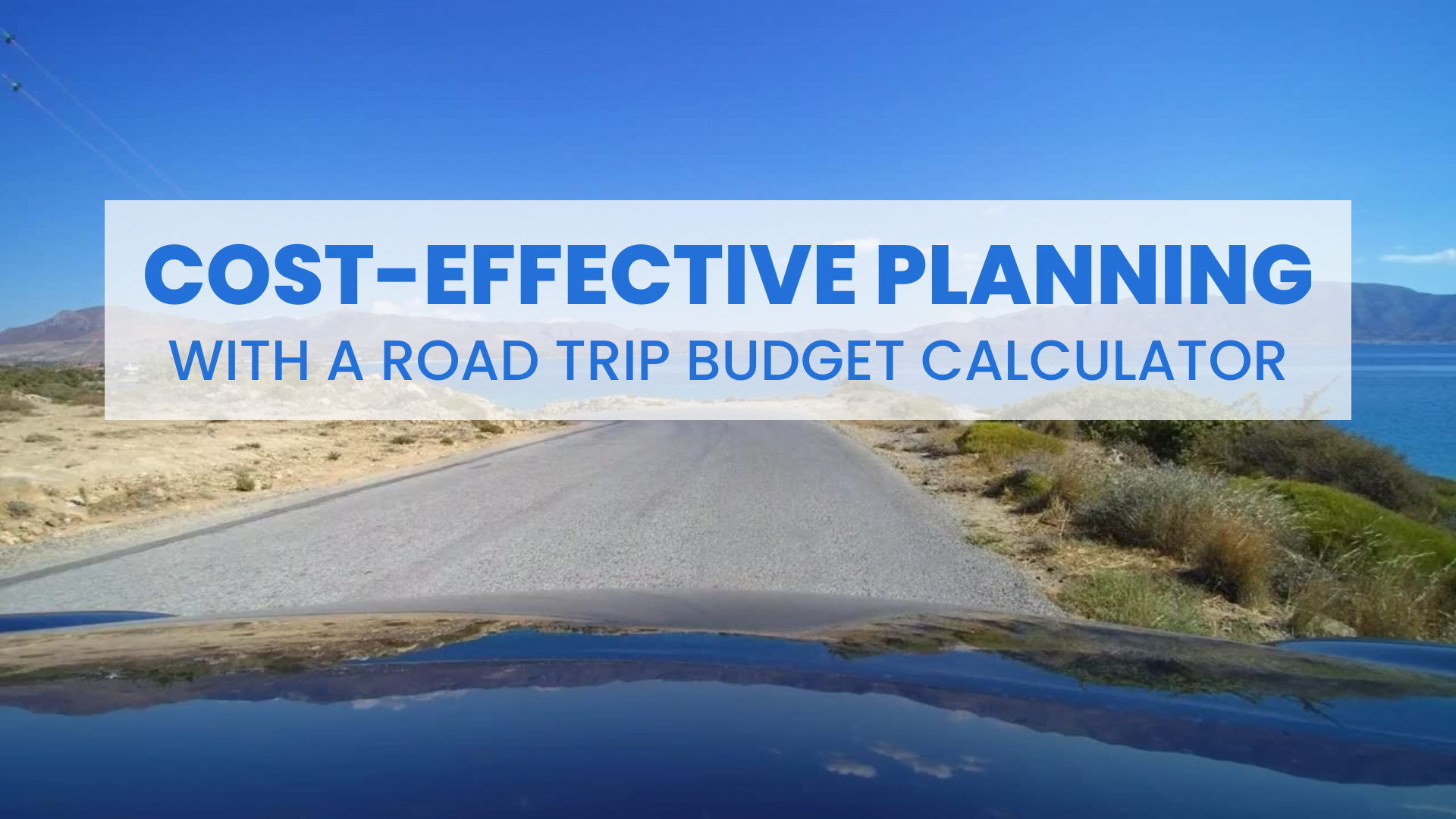Thinking about going on a road trip, but worried about the expenses? Look no further! In this article, we will guide you on how to do cost-effective road travels, plan and manage Your road trip costs. From budgeting and accommodation to meals and entertainment, we have got you covered. Get ready for an unforgettable journey while keeping your expenses in check!
Table of Contents
ToggleChoosing Your Route
Research the destinations
Before embarking on your road trip, take the time to research the destinations you’ll be visiting. Look up tourist attractions, landmarks, and points of interest that align with your interests and preferences. This will help you create a well-rounded itinerary that ensures you don’t miss out on any must-see spots along the way. Let the Itinerary Generator Tool do the heavy lifting for you and help you discover hidden gems. Try it Free following this link:
Consider distance and duration
When planning your route, it’s crucial to consider the distance and duration of the trip. Take into account your desired pace of travel and any time limitations you may have. Remember, the goal is to enjoy the journey, so make sure to allocate enough time for sightseeing and relaxation.
Factor in tolls and road conditions
It’s essential to factor in the costs associated with toll roads when planning your road trip budget. Research the toll rates in the regions you’ll be traveling through and allocate funds accordingly. Additionally, consider the road conditions along your planned route to anticipate any additional expenses for repairs or detours.
Budgeting for Fuel Cost-effective Road Travels
Calculate mileage
To effectively budget for fuel expenses, calculate the mileage of your trip. Use an online mapping tool to determine the distance between each destination and multiply it by your car’s average fuel consumption per mile. This will give you an estimate of how much fuel you’ll need for the entire trip.
Research gas prices
Gas prices can vary significantly from one region to another, so it’s wise to research the current gas prices along your route. Use websites or apps that provide up-to-date information on gas prices to help you find the most affordable options. This research will enable you to plan your fuel stops strategically, taking advantage of areas with lower prices.
Plan for fuel-efficient driving
One of the best ways to save on fuel costs during your road trip is to practice fuel-efficient driving. Avoid aggressive acceleration and braking, maintain a steady speed, and use cruise control when appropriate. Also, reduce your vehicle’s weight by removing unnecessary items from the trunk or roof racks. Small adjustments in driving habits can make a significant difference in fuel consumption, ultimately saving you money.
Accommodation Options
Consider camping
If you’re looking for a budget-friendly option for accommodation, consider camping along your road trip route. There are numerous campsites, both public and private, that offer stunning natural settings and basic amenities. Camping allows you to immerse yourself in nature while also saving money on expensive hotel stays.
Look for budget hotels
If camping isn’t your cup of tea, there are still ways to find affordable accommodation. Look for budget hotels or motels that offer clean and comfortable rooms at a fraction of the cost of upscale establishments. Websites and apps specialized in hotel bookings often provide filters that allow you to search specifically for budget-friendly options.
Stay with friends or relatives
Another cost-saving option is to reach out to friends or relatives along your route and see if you can arrange to stay with them for a night or two. Not only will this save you money, but it also provides an opportunity to reconnect with loved ones and make your road trip even more meaningful.
Food and Dining
Pack snacks and drinks
To save money on food expenses during your road trip, pack a variety of snacks and drinks. Fill a cooler with water, fruits, vegetables, sandwiches, and other easy-to-eat items that can keep you satisfied between meals. This way, you won’t have to rely solely on expensive convenience stores or restaurants for sustenance.
Research affordable dining options
While it’s undoubtedly enjoyable to indulge in local cuisine during your road trip, it’s essential to be mindful of your budget. Research affordable dining options in the areas you’ll be visiting, such as local eateries, food trucks, or even street vendors. These hidden gems often offer delicious meals at a fraction of the price you’d pay at touristy restaurants.
Cook your own meals
Consider cooking your own meals whenever possible, especially if you’re camping or staying at accommodations with kitchen facilities. This allows you to have more control over your food expenses and gives you the opportunity to experiment with local ingredients and recipes. Head to the nearest grocery store to stock up on essential supplies and enjoy a cost-effective and personalized dining experience.
Entertainment and Activities
Plan free or low-cost activities
Entertainment doesn’t have to break the bank during your road trip. Plan for free or low-cost activities that allow you to experience the local culture and attractions without spending a fortune. Take advantage of hiking trails, public parks, museums with discounted admissions, or walking tours that provide insight into the history and uniqueness of the area.
Look for local festivals and events
Research the local events and festivals happening in the destinations you’ll be visiting. Many cities and towns organize community events, such as parades, concerts, or art exhibits, which are often free or have a nominal entrance fee. Attending these events not only provides an opportunity for entertainment but also allows you to immerse yourself in the local culture and meet new people.
Consider national park passes
If your road trip involves visiting national parks, consider purchasing an annual national park pass. This pass grants you access to multiple parks within a given period, which can significantly reduce your overall expenses. National parks offer breathtaking scenery, hiking trails, and educational programs, making them a fantastic addition to any road trip itinerary.
Vehicle Maintenance
Check fluids and tires
Before hitting the road, it’s crucial to check your vehicle’s fluids and tire pressure. Ensure that your oil, coolant, brake fluid, and windshield wiper fluid are at the appropriate levels. Additionally, inspect your tires for any signs of wear and check the tread depth. Proper vehicle maintenance reduces the risk of unexpected breakdowns and costly repairs.
Perform routine maintenance
Regular vehicle maintenance is essential to keep your car running smoothly throughout your road trip. Schedule a tune-up with a trusted mechanic before your departure date. This may include an oil change, filter replacements, and inspections of the battery, brakes, and other components. By taking care of routine maintenance beforehand, you minimize the chances of encountering mechanical issues on the road.
Plan for unexpected repairs
Even with proper maintenance, unforeseen repairs can still happen during your road trip. It’s prudent to set aside a small portion of your budget for potential repairs or emergencies. Consider purchasing a roadside assistance package that provides services like towing, tire changes, and jump-starts. This additional coverage can offer peace of mind and save you from significant costs in the event of a breakdown.
Travel Insurance
Assess your existing coverage
Before purchasing travel insurance for your road trip, assess your existing coverage, such as health insurance or automobile insurance. Look for any potential gaps in coverage that may leave you vulnerable in case of an accident or medical emergency. Understanding what is already covered will help you make an informed decision about what additional insurance you may need.
Compare travel insurance policies
Research different travel insurance policies and compare their coverage, benefits, and costs. Look for policies that offer coverage for trip cancellation, emergencies, and medical expenses. Consider the duration of your road trip and the destinations you’ll be visiting to find a policy that meets your specific needs. Pay attention to any limitations or exclusions outlined in the policy to ensure you have the necessary coverage.
Consider coverage for emergencies
When selecting travel insurance for your road trip, it’s crucial to consider coverage for emergencies. This includes medical evacuations, hospitalizations, and repatriation of remains if needed. Additionally, check if the policy provides coverage for rental car accidents or other incidents related to your vehicle. Being prepared for emergencies will give you peace of mind and protect you financially in unforeseen situations.
Packing and Luggage
Pack light and efficiently
When it comes to packing for a road trip, less is often more. Pack light and efficiently, only bringing the essentials to avoid excessive baggage. Consider the climate and activities you’ll be engaging in to ensure you’re prepared with the right clothing and gear. Make a list of items you’ll need and stick to it, resisting the temptation to overpack.
Use reusable containers and bags
Opt for reusable containers and bags when packing food, snacks, and drinks for your road trip. This not only reduces waste but also helps keep everything organized and easily accessible. Use reusable water bottles or travel mugs to minimize the need for single-use plastics while staying hydrated on the road.
Bring essential road trip items
In addition to clothing and toiletries, there are a few essential items you should bring on your road trip. These include a roadside emergency kit with basic tools, a spare tire, jumper cables, and a flashlight. Don’t forget a detailed map or reliable GPS system, portable phone chargers, and any necessary medications. Being prepared with these items ensures you’re ready for any unexpected situations that may arise.
Saving on Souvenirs
Look for local crafts and markets
When it comes to souvenirs, skip the tourist traps and look for local crafts and markets instead. These hidden gems often offer unique and authentic items at more affordable prices. Support local artisans and browse through handmade jewelry, artwork, clothing, or other souvenirs that serve as a meaningful reminder of your road trip.
Consider practical souvenirs
Instead of traditional trinkets or knick-knacks, consider practical souvenirs that you can use in your everyday life. This could be a local cookbook, a handcrafted kitchen utensil, or a regional specialty food item to enjoy long after your road trip is over. Practical souvenirs not only save you money but also serve as functional reminders of your unforgettable journey.
Set a budget for souvenir purchases
To ensure you don’t overspend on souvenirs, set a budget before your road trip. Determine how much you’re willing to allocate for these mementos and stick to it. This will help you prioritize your purchases and prevent any post-trip regrets about unnecessary spending. Remember, the memories and experiences from your road trip are the most valuable souvenirs of all.
Finalizing Your Budget
Track expenses during the trip
Throughout your road trip, diligently track your expenses to stay within your budget. Keep a record of fuel costs, accommodation expenses, dining receipts, and any other purchases along the way. Various budgeting apps or spreadsheets can help you stay organized and provide a clear overview of your spending throughout the trip.
Make adjustments as needed
As you track your expenses, be prepared to make adjustments to your budget if necessary. If you notice that you’re exceeding your estimated costs in certain areas, look for ways to cut back in other categories. This flexibility will allow you to stay on track financially and ensure you can fully enjoy your road trip without any unnecessary financial stress.
Review and analyze your spending
Once your road trip is complete, take the time to review and analyze your spending. Look for patterns or areas where you may have overspent. This analysis will provide valuable insights for future road trips and help you make more accurate budget projections. Additionally, reflecting on your spending habits allows you to develop better financial management skills for future adventures.



